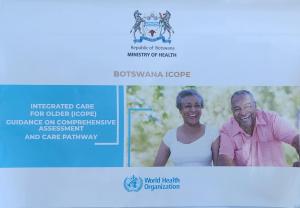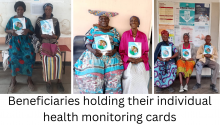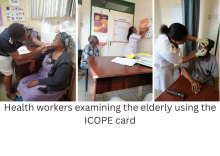Botswana to be a better place to grow old
Estimated at 43 million in 2010, the population of elderly people in sub-Saharan Africa is projected to reach 67 million by 2025 and 163 million by 2050, according to WHO.
The population of older persons in Botswana is growing and as in most developing countries, the socio-economic development has often not kept pace with the rapid speed of the ageing population. The proportion of older persons was 6% which was an increase from 5% in 2001 and is projected to be more than 8.5% and 20% in 2021 and 2050, respectively (National Census 2011).
Botswana’s health care system facilitates access to health facilities within a 5 to 8 kilometres radius for 90% of its population. However, this does not translate into access to quality health care for older adults.There are gaps in their care as revealed by the rapid situational analysis of older adults' health conducted in 2019 by the Ministry of Health and supported by WHO. Among the gaps identified were:
- lack of policy specifically addressing older peoples’ issues;
- no specific law to protect the rights of older adults;
- health systems are not aligned with the needs of older adults;
- health care system is integrative in nature but does not have data disaggregated enough for the health status of older adults to be monitored;
- high prevalence of non-communicable diseases;
- frequent loss of memory identified, significant impairment and disabilities among this population which is a consequence of the high prevalence of chronic diseases, co-morbidity and the natural ageing process;
- high poverty level;
- only 9% above the poverty datum line;
- older adults are victims of allegations of witchcraft;
- unhealthy eating habits;
- high tobacco consumption at 18% (12.3% females and 23,7% males);
- high alcohol consumption of 18.6% (25.5% females and 11.7% males).
In response to the above gaps, the ministry and WHO developed the Healthy and Active Ageing Strategy 2021 – 2026. In addition, the Ministry of Health has adapted WHO Integrated Care for Older People (ICOPE) assessment and monitoring card, which was piloted in October 2022
WHO developed the Integrated Care for the Older People global guidelines and Botswana adapted them for its health facilities. To implement the ICOPE guidelines, the Ministry of Health developed a health monitoring tool. The tool is an assessment card which is client retained for purposes of care and follow-up of older people during hospital or clinic visits. It is not necessarily used for sickness, but for a general and comprehensive examination of a client during medical check-ups.
The card has several assessment components used by health workers to determine the health needs of an older adult. The assessment employs multiple tools to determine the loss of intrinsic capacity, some of which are physical, nutritional, cognitive, sensory hearing and vision, urine incontinence, sexuality oral health, etc.
In the pilot roll-out, four districts were selected with 337 old people screened using the ICOPE card. This exercise assisted the MoH to determine the user–friendliness of the card and based on the findings, the ministry’s specialists amend the tool. Once this phase is concluded, the card will be officially ready to be used country-wide.


